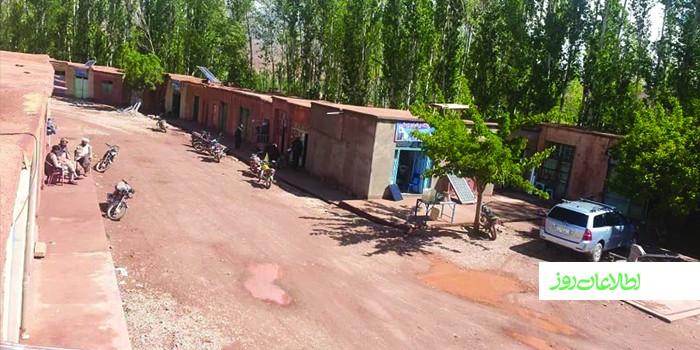The Taliban militants have cut all supply routes to Taywara district of the central Ghor province over the last 20 days, to put more pressure on the local government and civilians most of who are currently facing dire food scarcity. With an estimated 70,000 population, Taywara district is exposed to man-made tragedy, with food prices have already jumped up and shop encasements limping empty.
“The Taliban tried to overrun Taywara district center but in vain. Now, with blocking all routes leading to Taywara, the Taliban are making the living condition hard for the people and increase their cruelty,” said Habibul Rahman Malikzada, police chief of the district. According to him, the militants launched large-scale attacks on the battleground but they were repelled by the Afghan defense and security forces.
Located 220 kilometers to the west of Ferozkoh, the capital city of Ghor province, Taywara is one of the remotest districts in the province which shares border with the volatile provinces of Helmand in the south and Farah in the west.
In the latest wave of violence on May 05, a man lost his life to a Taliban-planted roadside bomb and a woman was wounded while they were heading to the district center coming from Nimruz province. On March 02, a magnetic bomb killed the district governor of Taywara. The bomb was attached to his car and he was driving to his office.
Following his death, the district has no governor, according to locals.
Gholam Mohammad, 55, who is a resident of the district, says that he takes a seven-hour-long impassible mountainous way back and forth to the areas controlled by the Taliban. “The Taliban have planted [landmines] in main and sub-roads,” he said.
Locals say the blockade imposed by the Taliban harms civilians as the government forces are supplied by air.
Food scarcity looms
The district center is facing a severe shortage of basic materials as routes leading to Taywara are either planted with landmines or controlled by Taliban checkpoints, says Mohammad Yar, 53, who is a shopkeeper in Taywara district center. Most basic materials needed in the district are supplied from Herat and Kandahar markets but all shops are currently running out of materials as a result of the Taliban’s siege on the district.
The price for a 10Kg cooking oil has raised from 900 afghanis to 1,200 afghanis and the price for a 25Kg gunny of rice has raised from 1,100 afghanis to 1,600 afghanis, according to Mohammad Yar. “My shop has already run out of cookies. It’s been two months now that no material has been supplied from Herat and Kandahar to Taywara. We urge the Taliban to make peace and allow the supply of basic materials to Taywara.”
Mohammad Dawood, 42, who is a resident of the district, complains about skyrocketing prices in Taywara, underlining that they are now living in a harsh condition. He is concerned that he will not be able to provide a living for his nine-membered family. “The prices for cooking oil, rice, and other materials have increased. If it continues, I do not have the money to provide for the living expenses of my family. The only demand I have from the Taliban is to open the routes,” he said.
A threatening drought has also added to the problems of the locals in Ghor, particularly this remote district. Dawood has cultivated wheat, barley, and rice in his two acres of farmland but he is unlikely to collect a satisfactory harvest.
Militants put military pressure
Taywara has witnessed a growing Taliban insurgency since the beginning of this solar year. Official records suggest that eight police forces were killed and four others wounded fighting against the insurgents over the past one months and 18 days.
Around 1,800 Taliban militants have gathered in areas close to the district’s center preparing to take over it, says Habibul Rahman Malikzada, Taywara police chief. According to the local police official, the Taliban deploy fighters from neighboring provinces to Taywara and even do not allow supply of medicines to the district.
As he put, what has led to the fragility of the situation is the Taliban’s ‘economic siege’ of the district.
Abdul Zahir Faizzadah, the governor of Ghor, told Kabul Now that the government forces repelled the Taliban military campaign, defeating them on the battleground around the district. “The Taliban have not made any progress in any district of Ghor this year.”
According to the governor, the province’s military council has already prepared and sent a plan on how to contain security threats in the province to the Ministry of Defense and they are waiting for the Ministry’s approval to start clearance operation along the highways connecting Ghor to other parts of the country.
Security forces facing food shortage
A police source who talked on condition of anonymity told Kabul Now that over the last couple of weeks, security forces in Taywara district were not supplied with enough amount of food material.
The police forces have around 700,000 debts for purchasing food materials from shopkeepers in the district center, the source stated, adding that now these security forces are also facing difficulties as the market runs out of basic materials.
A number of police forces stationed in Taywara district, meanwhile, described the problem of food shortage as a permanent problem calling on the government to resolve it.
Spokesperson for the Ministry of Interior, Tariq Arian, told Kabul Now that the government will resolve the problem of food shortage for security forces in Taywara until the next week.
This report has been prepared by Etilaat Roz’s Wajid Rouhani and translated by Mokhtar Yasa.




